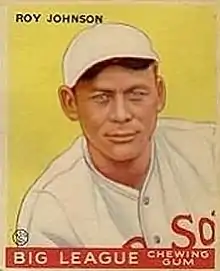Roy Johnson
Roy Cleveland Johnson (February 23, 1903 – September 10, 1973) was a left fielder/right fielder in Major League Baseball who played for the Detroit Tigers (1929–32), Boston Red Sox (1932–35), New York Yankees (1936–37) and Boston Bees (1937–38). A native of Pryor, Oklahoma, he batted left-handed and threw right-handed. His younger brother, Indian Bob Johnson, also was a major league player.
| Roy Johnson | |||
|---|---|---|---|
 | |||
| Outfielder | |||
| Born: February 23, 1903 Pryor, Oklahoma | |||
| Died: September 10, 1973 (aged 70) Tacoma, Washington | |||
| |||
| MLB debut | |||
| April 18, 1929, for the Detroit Tigers | |||
| Last MLB appearance | |||
| April 27, 1938, for the Boston Bees | |||
| MLB statistics | |||
| Batting average | .296 | ||
| Home runs | 58 | ||
| Runs batted in | 555 | ||
| Teams | |||
| Career highlights and awards | |||
| |||
Pacific Coast League
Like his brother Bob, Johnson was one-quarter Cherokee and grew up in Tacoma, Washington. Basically a contact, line-drive hitter, he was a fine outfielder with a strong throwing arm. From 1926 to 1928, he teamed with Earl Averill and Smead Jolley to give the San Francisco Seals of the Pacific Coast League one of its most feared hitting-outfields in minor league history.
Major league playing career
Johnson, who spent most of his time in the majors with the Detroit Tigers and Boston Red Sox, also played in part of two seasons both for the New Yankees and Boston Bees. A four-time .300 hitter, he often finished among the American League leaders in stolen bases.
In his 1929 debut, Johnson became the first rookie in major league history to get 200 hits in a season (201) and also led the AL with 45 doubles and 640 at-bats while hitting .314 with a career-high 128 runs. In 1931, he led the AL with 19 triples and stole 33 bases.
Traded by Detroit to the Red Sox in the 1932 midseason, Johnson enjoyed three productive years with Boston hitting .313 with 95 runs batted in during 1933, following with career-highs .320 and 119 RBI in 1934, and .315 in 1935. After that, he became a part-time outfielder with the Yankees as he appeared in the 1936 World Series as a pinch runner and striking out in his only plate appearance.
One month into the 1937 season, the Yankees lost two in a row to the Tigers. Johnson thought that manager Joe McCarthy was brooding over the losses, and snapped, "What's the guy expect to do, win every day?" In a horrible stroke of luck, McCarthy happened to overhear him. Almost as soon as he returned to the team hotel, McCarthy called general manager Ed Barrow and demanded that Johnson be waived immediately. Barrow obliged; Tommy Henrich took Johnson's spot on the roster.[1] The Boston Bees claimed Johnson off waivers, and Johnson stayed there until 1938, when he was sent to the minors. Although he rose as high as Double-A--the equivalent of Triple-A today—he would never play in the majors again.
In a ten-season career covering 1155 games, Johnson posted a .296 batting average (1292-for-4359) with 716 runs, 275 doubles, 83 triples, 58 home runs, 555 RBI, 135 stolen bases, 489 walks, .369 on-base percentage and .437 slugging percentage. Not known for his defense, he recorded a .938 fielding percentage as an outfielder.
Johnson died in Tacoma, Washington, at the age of 70.
Records
Johnson holds the following Detroit Tigers records:
- Most runs by rookie—128 (1929)
- Most doubles by rookie—45 (1929)
Honors
- Tacoma-Pierce County Sports Hall of Fame (member since 1960)
- State of Washington Sports Hall of Fame (member since 1978)
See also
References
- Appel, Marty (2014). Pinstripe Empire. New York: Bloomsbury USA. ISBN 9781608194926.
External links
- Baseball Library.com
- Baseball Reference
- Red Sox Connection
- The Deadball Era